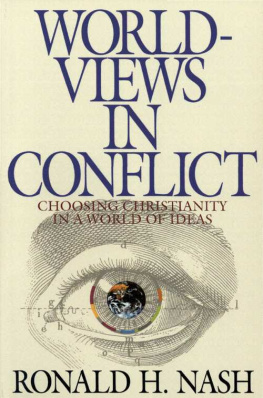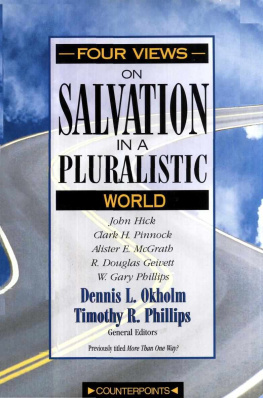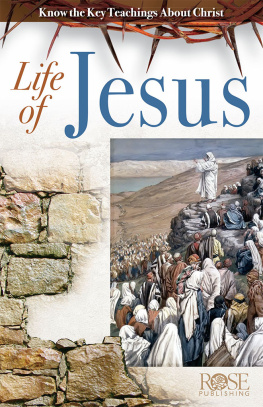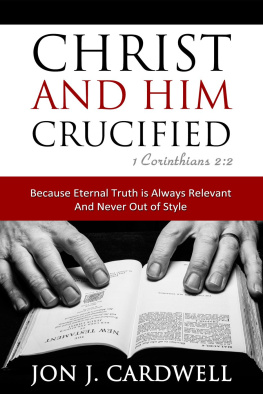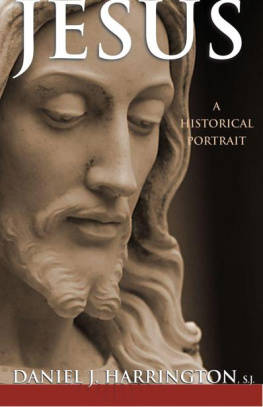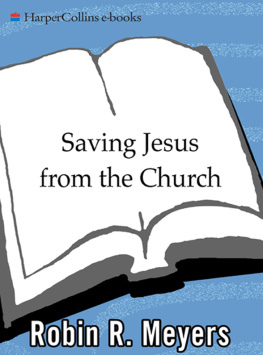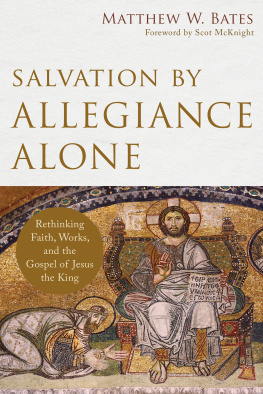ZONDERVAN
Is Jesus the Only Savior?
Copyright 1994 by Ronald H. Nash
All rights reserved under International and Pan-American Copyright Conventions. By payment of the required fees, you have been granted the non-exclusive, non-transferable right to access and read the text of this e-book on-screen. No part of this text may be reproduced, transmitted, downloaded, decompiled, reverse engineered, or stored in or introduced into any information storage and retrieval system, in any form or by any means, whether electronic or mechanical, now known or hereinafter invented, without the express written permission of Zondervan.
EPub Edition JUNE 2010 ISBN : 978-0-310-87712-7
Queries may be addressed to:
Zondervan Publishing House
5300 Patterson Avenue S.E.
Grand Rapids, Michigan 49530.
Library of Congress Cataloging-in-Publication Data
Nash, Ronald H.
Is Jesus the only savior? / Ronald H. Nash
p. cm.
Includes bibliographical references and index.
ISBN 0-310-44391-1 (pbk.)
1. Salvation outside the church. 2. Jesus ChristHistory of doctrines20th century. 3. Religious pluralism. 4. Hick, John. I. Title.
BT759.N37 1994
94-8317
261.2dc20
CIP
All Scripture quotations, unless otherwise indicated, are taken from the Holy Bible: New International Version. NIV. Copyright 1973, 1978, 1984 by International Bible Society. Used by permission of Zondervan Publishing House. All rights reserved.
Information about External Hyperlinks in this ebook
Please note that footnotes in this ebook may contain hyperlinks to external websites as part of bibliographic citations. These hyperlinks have not been activated by the publisher, who cannot verify the accuracy of these links beyond the date of publication.
To Andrew Michael Nash
Table of Contents
Once upon a time Christians were identifiable by an unqualified commitment to Jesus Christ as the one and only Savior of the world. But the unity of Christians on this fundamental issue has disappeared. Today many people who claim to be Christians choose among three fundamentally different answers to the question, Is Jesus the only Savior? These answers can be stated succinctly:
No!
Yes, but
Yes, period!
The negative answerthe belief that Jesus is not the only Savioris commonly called pluralism. People holding this view think that there are many paths to salvation and that Jesus is only one of them.
The unqualified affirmative answer (Yes, period!) is undoubtedly the one that most readers of this book identify with. This view is often called exclusivism because it teaches that there is one exclusive way whereby men and women can approach God and receive his salvation: Jesus Christ. Sometimes this position is called restrictivism because it teaches that salvation is restricted to people who come to have explicit faith in Jesus Christ.
The qualified affirmative answer (Yes, but) is the favored view of a growing number of Christian college and seminary professors. But it is also held by many pastors, Christian workers, and denominational leaders who were introduced to the theory by their professors. This position is commonly called inclusivism because its adherents believe that the scope of Gods salvation is significantly wider than that held by exclusivists. It is so wide or broad that it includes many people who have not explicitly believed in Jesus.
This book examines these three competing views, identifies some of their major proponents, and explains why they believe as they do, with a view to determining which is true.
When people adopt pluralism, they must abandon every core doctrine of the Christian faith, including the Trinity, the deity of Christ, the Incarnation, and the Atonement. Inclusivism has a significant deleterious effect on the nature and importance of such Christian activities as evangelism and missions.
My book is hardly the first on this subject, as the bibliography shows, but right now it is the only book I know of that defends the exclusivist position in the context of the current debate. This book also differs from others by what I trust is its greater accessibility to the nonspecialized reader. Where the material gets difficult, I have tried to simplify as much as possible without doing an injustice to my sources. The reader will encounter a minimal number of technical terms and complex ideas. But I believe I have managed to explain the terms and ideas in a way that even novices will find understandable.
I want to acknowledge the help and assistance of a number of people. Dr. Doug Geivett of Talbot Theological Seminary and Dr. Ken Gentry, Jr., of Christ College (Greenville, S.C.) read the entire manuscript and offered many helpful suggestions. I also appreciate the help provided by Paul Eddy, Brad Stetson, and David Melvin of the National Association of Evangelicals; Dr. Roger Nicole, my colleague at Reformed Theological Seminary Orlando; and Amy Sherman, editor of Stewardship Journal.
NOTES
I have examined these other challenges in various books. For discussions of liberation theology, see Humberto Belli and Ronald Nash, Beyond Liberation Theology (Grand Rapids: Baker, 1992), as well as my Poverty and Wealth (Dallas: Probe Books, 1992) and Liberation Theology (Grand Rapids: Baker, 1988). For treatments of process theology, see Ronald Nash, ed., Process Theology (Grand Rapids: Baker, 1987) and my book The Concept of God (Grand Rapids: Zondervan, 1983). For an introduction to feminist theology, see my Great Divides (Colorado Springs: NavPress, 1993).
Chapter One
IS JESUS THE ONLY SAVIOR?
Three conflicting answers to the question Is Jesus the only Savior? spark a debate that is dividing religious thinkers in the English-speaking world. This chapter explains the oldest of the three views, Christian exclusivism, the position that answers our question with an unqualified yes. The other two answers, pluralism and inclusivism, arise mainly out of opposition to exclusivism.
I have three major reasons for writing this book: (1) To see whether pluralism succeeds in developing a strong enough case against exclusivism to lead thoughtful people to abandon the Christian churchs historic teaching that Jesus is the only Savior (part 1); (2) to see whether inclusivism succeeds in developing a strong enough case against exclusivism to lead thoughtful Christians to embrace inclusivism (part 2); and (3) to present at least some of the reasons why many thoughtful and conscientious Christians continue to espouse Christian exclusivism.
A DEFINITION OF CHRISTIAN EXCLUSIVISM
Christian exclusivism can be defined as the belief that (1) Jesus Christ is the only Savior, and (2) explicit faith in Jesus Christ is necessary for salvation. The first claim denies that there are or can be other saviors, a fact that distinguishes it from pluralism. The second claim denies that people may be saved without conscious and explicit faith in Jesus Christ, which sets it apart from inclusivism. Christian exclusivists begin by believing that the tenets of one religionin this case, Christianityare true and that any religious beliefs that are logically incompatible with those tenets are false.
EXCLUSIVISM AND BIBLICAL AUTHORITY
Some people cannot understand why the Bible plays such a normative role in Christian thinking. Such people need to recognize that while humans are free to reject the authority of Scripture, they will only substitute some other authority in its place. Usually that authority is either their own opinions or those of other people. Christians believe that the Bible is Gods special revelation inscripturated, or communicated in writing. People who think this way understandably prefer the authority of God to that of some fallen and fallible human being.


